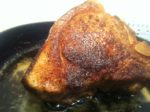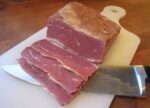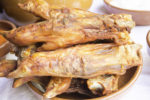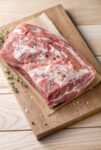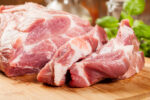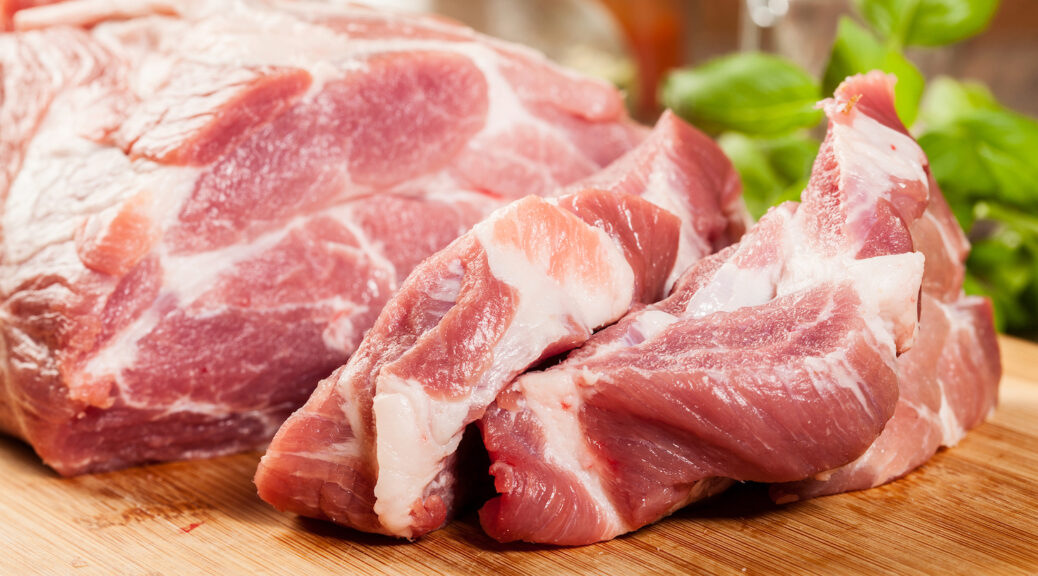
Preserve Meat by Pickling with Salt
“Salting is the process of preserving food with dry edible salt. It is related to pickling in general and more specifically to brining (salty water) and is one form of curing. It is one of the oldest methods of preserving food.” (Source: Wikipedia) NOTE: While looking online at modern methods of preserving with salt, most of the information says to use canning salt, also called kosher salt, and not to use iodized salt. In 1800s cookbooks, pickling is usually the term used when referring to salting foods for preservation, but sometimes meats were pickled with vinegar and that was called pickling, too.INFORMATION BELOW COMPILED FROM 1800s COOKBOOKS PICKLING MEAT In pickling or salting meat, it is better to let the fresh joint first hang for two or three days untouched. This will make the meat more tender. Before salting it, be careful to remove every pipe or kernel in the meat, and fill up all holes with salt. Do not attempt to pickle meat in very cold frosty weather, or in warm damp weather. It is a good plan to sprinkle the meat with water and then to hang it up for a few hours before salting it. This cleanses it from any blood and makes the flavor more delicate. A good brine, sufficient for twenty pounds of beef, is made by mixing together three pounds of salt, three-quarters of a pound of sugar, and two ounces of saltpeter.* Boil these ingredients together for twenty minutes in two gallons of water, skimming off all scum. Let the liquid get quite cold before you pour it over the meat, and see that the joint is thoroughly covered with the brine. For a smaller piece of meat, the quantities given for the brine can be easily reduced, following the same proportions carefully. The meat must be turned over every day and well basted with the brine, and the salting pan or tub must be covered with a clean piece of porous woolen material. The meat will be ready for use in a fortnight.* In cooking pickled or salted meat, two things must be recollected. First, that in order to make salted meat tender, it must be put into cold water when first placed on the fire. Secondly, that it is next to impossible to cook salted meat too slowly. *saltpeter or saltpetre – potassium nitrate, an early food preservative, but rarely used now. *fortnight – a period of two weeks. BRINE FOR PICKLING MEAT No. 2 To every four gallons of water, allow four pounds of fine salt, two ounces of saltpeter, three pounds of brown sugar, and two quarts of West India molasses. Boil the whole together, stirring it well, and skimming it after stirring. When clear, let it cool. The meat being clean and dry, rub it all over with ground red pepper. Then put as much meat into the pickling-tub as can be very well covered by the brine, which must be poured on cold. Let it remain six weeks in the pickle, (carefully taking off the scum,) and turning each piece every day. Afterwards, hang it till it is dry outside, and then smoke it well for a fortnight, hanging it high above the fire with the large end downward. The fire in the smoke-house should be steadily kept up all the time. Hickory or oak is the best wood for this purpose. On no account use pine, cedar, spruce, or hemlock. They will communicate to the meat a strong taste of turpentine, and render it uneatable. A fire made of corn-cobs is excellent for smoking meat, and they should be saved for that purpose. When the meat is smoked, rub it all over with ground pepper to prevent insects, and sew up all the pieces in new cotton cloths, coarse and thick, and then white-wash them. This pickle will be found excellent for hams, bacon, tongues, or beef. Meat for pickling must be very fresh, and of excellent quality. Before sewing it up in covers, see that it is free from insects. If to go to sea, pack in boxes of powdered charcoal for a long voyage. For a short one, barrels of wood-ashes will do. BRINE FOR PICKLING MEAT No. 3 For hams, tongues, or beef, a pickle may be made that will keep for years, if boiled and skimmed as often as it is used. Provide a deep earthen glazed pan that will hold four gallons, having a cover that will fit close. Put into it two gallons of spring water, two pounds of coarse sugar, two pounds of bay-salt, two pounds and a half of common salt, and half a pound of saltpeter. Keep the beef or hams as long as they will bear, [still fresh and not tainted] before they are put into the pickle.
Sprinkle them with coarse sugar in a pan and let them drain. Then rub them well with the pickle and pack them in close, putting as much as the pan will hold, so that the pickle may cover them.
The pickle is not to be boiled at first. A small ham may be fourteen days, a large one three weeks, a tongue twelve days, and beef in proportion to its size. They will eat well out of the pickle without drying.
When they are to be dried, let each be drained over the pan. When it will drop no longer, take a clean sponge and dry it thoroughly. Six or eight hours will smoke them, and there should be only a little saw-dust and wet straw used for this purpose. But if put into a baker’s chimney, they should be sown up in a coarse cloth, and hang a week.
PICKLED HAM After it has been a week in the pickle, boil a pint of vinegar, with two ounces of bay salt. Pour it hot on the ham, and baste it every day; it may then remain in the brine two or three weeks.
A PICKLE FOR BEEF To four gallons of water put a sufficient quantity of common salt; when quite dissolved, to bear an egg, four ounces of saltpeter, two ounces of bay-salt,* and half a pound of coarse sugar. Boil this pickle for twenty minutes, skim it well, and strain it. When quite cold, put in your beef, which should be quite covered with the pickle, and in nine days it will be fit for use; or you may keep it three months, and it will not be too salt. The pickle must be boiled and well skimmed at the end of six weeks, and every month afterwards. It will then keep three months in summer and much longer in winter. *bay-salt – salt derived by evaporating seawater in the sun. ================================================= Have You Ever Eaten Meat Preserved by Salting? Please Leave a Comment Below. =================================================